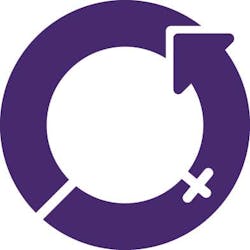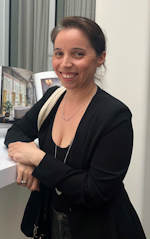She knew nothing about Afghanistan; even less about the rug industry. Clueless about social programs and international development practices, but she did know something.
Connie Duckworth knew business.
Today, fourteen years after founding Arzu Studio Hope in 2004, Connie Duckworth’s crusade to stop the exploitation of women and children in Afghanistan is transforming their society and saving lives.
Arzu—a 501(c)(3) in the U.S. and an international NGO operating in Afghanistan—employs women in the poor rural villages of Balmyan province. Their homes are provided looms to create beautiful hand-woven rugs for both the residential and commercial design markets. Social contracts with the weavers’ families help educate their children, provide women with literacy classes, and get pregnant women the medical care and protection they so desperately need.
But before Duckworth had taken on her cause for social justice, she was busy on the other side of the world, working as the first woman partner in sales and trading at Goldman Sachs. “I have a very thick skin, let me put it that way,” she says.
That’s an understatement. Originally based in Chicago with her husband and four kids, Duckworth was transferred from Goldman’s Chicago office to the company’s municipal bond department in New York City. Not wanting to uproot the family, she decided to commute Monday to Friday, which got old fast. After experiencing 9/11, not being able to contact her family and having to drive back home to Chicago, she decided it was time for the “next phase.” Duckworth retired at the end of the year.
Shortly after in the spring of 2002, she was elected by a friend to become part of the U.S. Afghan Women’s Council. In January 2003, Duckworth went on her first trip to Afghanistan with the first delegation allowed to travel overnight in the country.
“It was like stepping back in time 2,000 years. It looked like Berlin after World War II.”
U.S. Afghan Women’s Council
The group met with various heads of state over the course of the trip, but what truly struck a nerve was their last stop on the way back to the airport. The group visited a bombed out cinder block building that had no windows and doors, and found a number of women and children riding out the frigid winter. “There were kids standing there in flip-flops. I looked at those faces and some at the time were the ages of my kids. And that was the hook for me,” Duckworth recalls.
Galvanized to action, she drew from her own economic background to think of ways to help. “Having a job and an income of her own, in any culture, in any country, in any time, really gives a woman an opportunity for independence and respect that she wouldn’t otherwise have,” she says. While some argued that education would be more vital to these women, her mantra was “jobs first, and the rest will follow.”
Duckworth, a self-proclaimed “product agnostic,” admits that she went down a couple of blind alleys at first. After hitting a few walls in the apparel industry and doing some further research, she found rug production to be the only culturally acceptable practice that had been a long-standing tradition women could do in their own homes. “We’re still talking about a gender-segregated society and all over Afghanistan women live with their mothers-in-law. Women are sold into marriage. Girls are traded at puberty basically in the rural areas; they’re viewed as an economic unit for their families,” Duckworth explains.
The Arzu Social Contract
In order to ensure that production and processes are fair and child-labor free, prospective families are required to enter into the Arzu social contract. Members from the organization approach the male head of household (who could be a teenage son or an 80-year-old grandfather) and offer to strike a deal of a normal market weaving rate that comes with a 50 percent quality incentive at the end of each rug, making the wages significantly higher than average. Arzu provides materials and local staffers to ensure quality control, as well as looms in their homes.
But within the contract, families must also agree to release the women to Arzu for literacy classes. All children in the family (both boys and girls) must be registered in a government school full-time. Arzu also tracks pregnant women within the families, who are provided with a car, driver and female chaperone to accompany them to pre- and post-natal care and delivery. Emergency cell phones have been placed within the villages for the women to call the Arzu driver once labor commences. The results are astonishing: They haven’t lost a single mother or baby in childbirth since 2005—a groundbreaking statistic in a country that has one of the highest maternal death rates in the world, according to Duckworth.
A Long Journey to Weaving Quality
Setting up a footprint required more than just recruiting weavers though, and took about five years to achieve a quality and consistency that was up to the standards of the U.S. design community. This was achieved by establishing an all-local staff to purchase the wools and complete the dyeing and finishing. It was a logistical feat that speaks to Duckworth’s business acumen, and helps explain how the organization has grown from 30 weavers in June 2004 to approximately 400. The group has also managed to preserve hundreds of indigenous patterns that would have otherwise been lost—a remarkable outcome in its own right.
Arzu recently upped the ante with its Masters collection. The line features designs from legends Frank Gehry, Michael Graves, Zaha Hadid, Margaret McCurry, Robert A.M. Stern, and Stanley Tigerman. It is being distributed by Coalesse in the United States.
“This to me is a testament to these Afghan weavers, who I believe are some of the finest in the world,” Duckworth says of the Masters collection. “You take this group of famous iconic designers, and their work is being executed in the middle of nowhere. It represents this bridge between tradition and history and modernity. It’s incredible to me when I see these patterns because I know where they come from on both sides.”
MORE FROM 2018 WOMEN'S WEEK:
Inspired by International Women's Day
- International Women’s Day Spotlight: Dame Zaha Hadid
- Fauzia Khanani: Mindful Design and Taking Risks
- Tarkett Commits to Sustainability: “Together, We Can Do Good.”
- Maker Monday: Alison Owen
Arzu appropriately means “hope” in Dari, and that’s exactly what it’s provided for so many Afghani women. With their weavers now reading and writing at a fifth-grade level and programs expanding into clean water and housing, Duckworth is living proof that anything is possible, even in one of the worst places in the world to be a woman.




